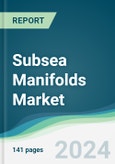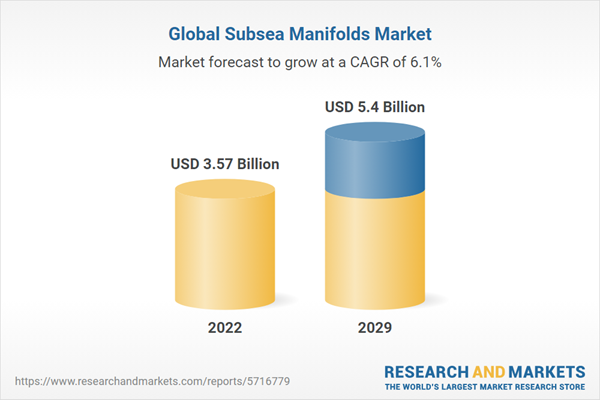The subsea manifolds market is expected to grow at a CAGR of 6.08% from US$3.572 billion in 2022 to US$5.401 billion in 2029.
The rising number of offshore drilling activities across the globe is the major driver of the subsea manifolds market. Subsea manifolds are designed to withstand tough and ultra-deep conditions which, in turn, is increasing the demand for subsea manifolds. The subsea manifolds market is segmented by application as oil production, gas lift injection, gas production, and water injection. Geographically, the market is segmented as North America, South America, Europe, the Middle East and Africa, and the Asia Pacific. North America holds the major market share owing to booming E&P activities in the U.S. and Mexico.MARKET DRIVERS:
Advancement in technology.
With advancements in technology, oil & gas operators are progressively using subsea technologies for the development of offshore hydrocarbon reserves. Subsea technologies are designed, keeping in mind, the harsh operating conditions in deep-water areas, and can be customized depending on the soil properties. In recent times, the majority of the hydrocarbon discoveries made in offshore areas were located in deep water. Consequently, subsea technologies are turning out to be more lucrative than conventional topside production technologies. Oil & gas exploration companies operating in offshore producing fields with heavy oils and low reservoir pressures prefer installing these technologies for attaining optimized levels of production.Subsea manifold systems are primary equipment, which is designed to tame the flow from subsea production wells to multiple production flowline headers. Subsea manifolds form an important part of subsea production systems as they allow operators to adapt to changing operating conditions. Subsea manifolds are designed flexibly according to the requirements of offshore operating companies. They enable operators to connect future subsea wells efficiently and mitigate production loss when the equipment is not working properly. In many offshore basins, production companies can install dual header manifolds suitable to their requirements.
Growth in drilling activities.
The global demand for subsea manifolds is rising due to the growing number of drilling activities. Subsea manifolds for production purposes are used for various applications by energy & power companies including, allocation management, sampling, well testing, and isolation. These types of systems are subsea structures consisting of pipework and valves designed and manufactured in a manner to direct the produced resources from the wells into multiple flow lines. The flexible design of these subsea production manifolds allows the operators to generate flow line connections, while also enabling the gas lift distribution, from multiple wells simultaneously. These systems can be used to attain vertical or horizontal flow line connections.The benefits and features of the vertical flow line connections encapsulate compact structural design, installation of a simplified jumper, direct mounting to the desired foundation, and configurable utilizing retrievable or internal pigging loops for round-trip pigging. The horizontal flow line connections using production manifold systems have various benefits that include, reduction in snagging risk during working in shallow waters, smooth flow of fluids on account of facilitated self-draining, enhanced protection for dropped-object, and integrated guidance system to enable accurate connections.
The Asia Pacific subsea manifolds market is anticipated to grow significantly.
Asia Pacific is expected to be the leading market due to the growing acreages in shale basins along with the plans of governments to expand the existing production capacity of the shale gas in this region are projected to propel the market growth in this region over the forecast period. Favorable government support along with growing exploration and production activities in China is expected to drive offshore drilling activities in the country. The Chinese government has been encouraging coal bed methane exploitation through subsidies.Early developments of North America’s shale gas reserves from deep water coupled with favorable governmental regulations to develop other unconventional hydrocarbon reserves have accelerated the offshore drilling market in this region. According to the US Energy Information Administration, the net petroleum imports have been going down on account of the increasing domestic oil production. This drop is due to the increasing offshore horizontal drilling in the region. The North American regional government has also sanctioned various deep-water projects in the Gulf of Mexico, which are likely to increase the demand for subsea manifolds. Increasing offshore E&P activities in the offshore Gulf of Mexico, along with offshore California are predicted to drive the investments for subsea manifolds and thus propel the market over the analyzed period.
Key Developments:
- In June 2023, TechnipFMC and Chevron Australia Pty Ltd inked a 20-year framework agreement that permits TechnipFMC to supply Subsea 2.0TM configure-to-order subsea production systems for gas field projects off the northwest coast of Australia. The provision of flying leads, flexible jumpers, controllers, manifolds, tree systems, and wellheads is covered under the agreement.
- In February 2023, Azule Energy gave a significant contract to Baker Hughes, an energy technology business, to supply subsea equipment and services for work in the Agogo oilfield, offshore Angola. This is the first significant greenfield project award in offshore Angola to be made in over five years.
Segmentation:
By Application
- Oil Production
- Gas Lift Injection
- Gas Production
- Water Injection
- Others
By Geography
- North America
- United States
- Canada
- Mexico
- South America
- Brazil
- Argentina
- Others
- Europe
- UK
- Germany
- France
- Italy
- Spain
- Others
- Middle East and Africa (MEA)
- Saudi Arabia
- UAE
- Isreal
- Others
- Asia Pacific
- Japan
- China
- India
- Australia
- South Korea
- Indonesia
- Thailand
- Taiwan
- Others
Table of Contents
Companies Mentioned
- Schlumberger Limited
- Halliburton Company
- General Electric company
- Worldwide Oilfield Machine Inc.
- Dril-Quip, Inc.
- Trendsetter Engineering
- Aker Solutions ASA
- Technip FMC
- Baker Hughes Company
Table Information
| Report Attribute | Details |
|---|---|
| No. of Pages | 141 |
| Published | February 2024 |
| Forecast Period | 2022 - 2029 |
| Estimated Market Value ( USD | $ 3.57 Billion |
| Forecasted Market Value ( USD | $ 5.4 Billion |
| Compound Annual Growth Rate | 6.0% |
| Regions Covered | Global |
| No. of Companies Mentioned | 9 |









